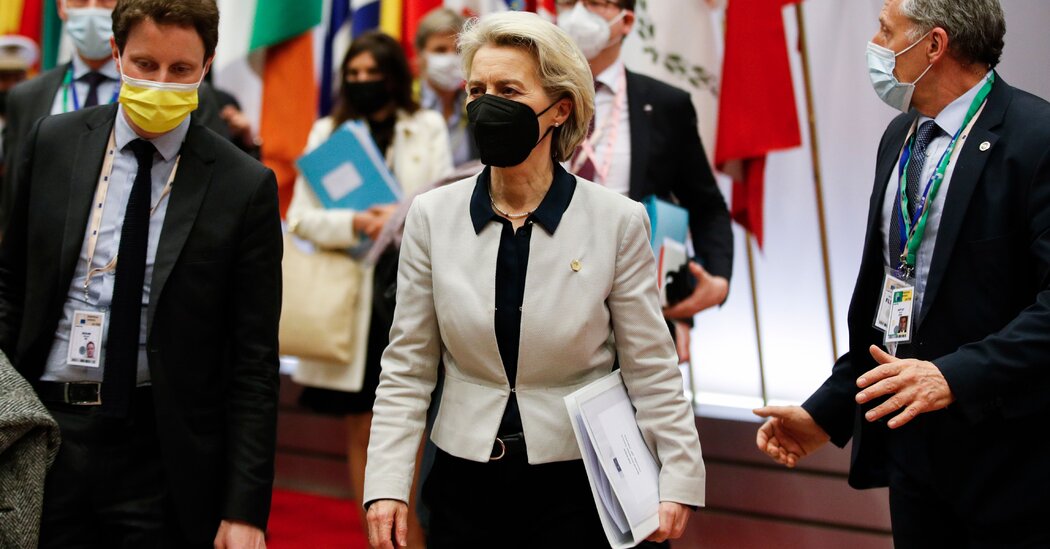
BRUSSELS — European leaders meeting into the early hours of Friday hammered out an agreement over a new set of sanctions aimed more broadly at the Russian economy and at President Vladimir V. Putin himself, as his troops advanced in their invasion of Ukraine.
One of the decisions was to freeze the assets of Mr. Putin of Russia and his foreign minister, Sergey V. Lavrov, but not impose a travel ban on them, three European Union diplomats and officials familiar with the draft E.U. sanctions said on Friday.
The bloc’s 27 members had been able to push out a first set of sanctions on Wednesday in response to Mr. Putin’s recognition of separatist enclaves in Ukraine, and they did so in record time.
But the second package of penalties, which they described as unprecedented for the European Union in terms of size and reach, was harder to forge consensus on, even as Russian forces approached Kyiv, Ukraine’s capital, and war in Europe was no longer theoretical, but a devastating reality.
Europe’s economies are deeply intertwined with Russia’s, and the more the European Union leans into Russian sanctions, the more its own members will also feel the pain. The toughest of sanctions could even derail the bloc’s tentative recovery from the recession induced by two years of pandemic.
That is why negotiators left off the table particularly difficult elements — like imposing sanctions on oil and gas companies or banning Russia from SWIFT, the platform used to carry out global financial transactions on commodities including wheat.
E.U. officials said one key reason for their reluctance to cut Russia’s access to the platform was that Europe uses it to pay for the gas it buys from Russia — a double whammy of dependence — and the disruption would cause the bloc major problems.
Experts said that the sanctions approved were tough and that the speed at which the European Union was moving was impressive. But in view of how dramatic developments were in Ukraine, some were critical of the leaders for not going further.
“This morning, we are defending our state alone,” he said. “Like yesterday, the world’s most powerful forces are watching from afar. Did yesterday’s sanctions convince Russia? We hear in our sky and see on our earth this was not enough.”
Ursula von der Leyen, president of the European Commission, the bloc’s executive branch that carried out the painstaking technical work behind sanctions, said Friday morning that the sanctions would hit the Russian economy’s ability to function by starving it of important technology and access to finance.
“Now we have to meet the moment. We will hold the Kremlin accountable. The package of massive and targeted sanctions European leaders approved tonight clearly demonstrates that,” Ms. von der Leyen said after the meeting, which had started Thursday evening and ran for six hours.
“It will have maximum impact on the Russian economy and the political elite,” she added.
Its most ambitious elements were also the most technical: The European Union will ban the export of aircraft and spare parts that are necessary for the maintenance of Russian fleets. Ms. von der Leyen said that three-quarters of the aircraft in the Russian aviation fleet were made in the European Union, the United States or Canada, and these measures effectively meant many would soon be grounded.
The bloc will also ban the export of specialized oil-refining technology as well as semiconductors, and it will penalize more banks — although it will stop short of targeting VTB, Russia’s second-largest bank, which is already crippled by American and British sanctions, according to a draft describing the penalties seen by The New York Times.
And the European Union will target Russian elites further by cutting diplomatic and service passport holders’ access to E.U. visas, and by limiting Russian nationals’ abilities to make new financial deposits over 100,000 euros (about $112,000) into European bank accounts.
The bloc’s leaders blessed the sanctions package at their meeting, but its details and legal language remained to be worked out on Friday by E.U. ambassadors and foreign ministers.
Still, there were elements missing that several European member states, as well as the United States and Ukraine itself, would have liked to have been included.
One such measure was cutting Russia’s access to SWIFT, a step the United States and Canada had been prepared to take. Ukraine’s foreign minister, Dmytro Kuleba, pleaded for it on Thursday as E.U. leaders met, but the European Union balked.
President Biden said the measure was not off the table. “It is always an option. But right now, that’s not the position that the rest of Europe wishes to take,” he told reporters on Thursday when asked why the United States had not cut off Russia from SWIFT as part of its own sanctions package.
Understand Russia’s Attack on Ukraine
What is at the root of this invasion? Russia considers Ukraine within its natural sphere of influence, and it has grown unnerved at Ukraine’s closeness with the West and the prospect that the country might join NATO or the European Union. While Ukraine is part of neither, it receives financial and military aid from the United States and Europe.
Prime Minister Mark Rutte of the Netherlands, who has taken one of the hardest lines among E.U. leaders on imposing sanctions on Russia, said that he and others had been pushing for SWIFT to be included.
“Many colleagues pleaded for SWIFT,” he said, adding, “But we agreed more work needs to be done to assess what it means if Russia is cut off from SWIFT.”
While the bloc would place sanctions on Mr. Putin and his foreign minister Mr. Lavrov, freezing their assets in the European Union, the step was largely meant to be symbolic; most high-profile Russians use complex structures to conceal their assets in closely regulated European Union banks, and it’s usually difficult to get to the beneficiary owner of assets and accounts.
And while Britain took long-discussed steps to penalize oligarchs on Thursday, European Union leaders, under pressure from allies to do the same, instead agreed to change the legal language in the sanctions package in order to be able to take such a step in future.
The way Europe’s sanctions against Russia were shaping up highlighted that some E.U. countries, most prominent among them Germany and Italy, preferred an incremental approach to penalizing Mr. Putin, in part to protect a fragile post-pandemic economic recovery in Europe.
On the other side were countries neighboring Russia and Ukraine, like Poland, Estonia, Latvia and Lithuania, as well as the E.U.’s Nordic members and the Netherlands. They would prefer not to break up the sanctions into smaller packages but rather hit Mr. Putin with overwhelming economic measures that truly sting.
Prime Minister Mateusz Morawiecki of Poland spoke for many of them in a blunt statement as he arrived at the meeting in Brussels on Thursday evening.
“Talking is cheap. Enough of this cheap talking, there’s enough of naïveté around us, triviality,” he said. “We are buying as Europe, as the European Union, lots of Russian gas, lots of Russian oil. And President Putin is taking the money from us, Europeans, and he’s turning this into aggression.”
Monika Pronczuk contributed reporting.




